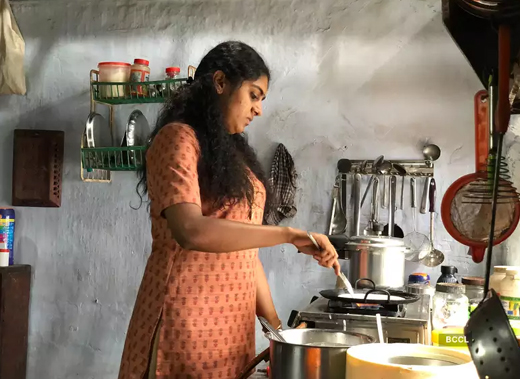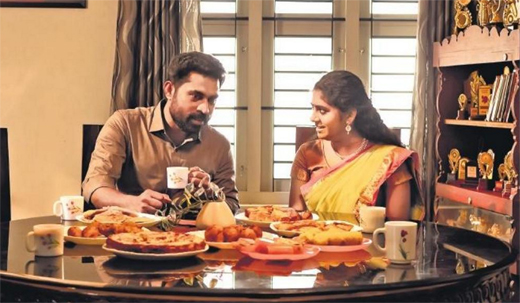The Great Indian Kitchen - The said and the Unsaid!
The Great Indian Kitchen - The said and the Unsaid!
Mangalore Today News Network
By Hemashree Sayed
Mangaluru, April 15, 2021: The Great Indian Kitchen, a recently OTT released Malayalam film is making the buzz around for all the right reasons.This is less of a movie review and more of bolstering my ramblings into a coherent thought.
The story revolves around a newly married girl and her struggles to fit into a conventional role as a wife and daughter-in-law that society expects out of married women.

Cathartic is an understatement for this exceptional film. A little bit exaggerated, for impact I’m sure, otherwise the movie is a powerful statement in itself. The filmmaker’s deliberate attempt to direct the viewers into the grossness of the setup is highly commendable.
Stellar performances by Nimisha Sajayan and Suraj Venjaramood along with other supporting cast adds to the spotlight. Director Joe Baby’s decision to have no background music is a genius way of filmmaking and shows how real he wanted it to be. Of course, in real lives we don’t have background music playing for us when we are sad or elated or just angry. The sound designing is incredible along with excellent cinematography.
On the face of it, it is too real
‘The Great Indian Kitchen’ will come across as a sure shocker for many.
‘She should know what she’s getting into’! right? That’s what it seems like initially. Isn’t this all ‘normal’ and what’s this all fuss about? The film shows us the life of many women after the marriage. The immediate change they have to fit into. Getting into a new household, adapting to new people, new set of rules, new lifestyle, new ways of dealing things, basically everything new.
And for men, literally nothing really changes when they get married, other than that there is a new person now sharing their bed and they instantly get a new caretaker for the rest of their lives. And THIS IS ALL NORMAL, right? what’s this fuss all about?
But as the movie starts to sink into our minds, the unsettling begins. The reality of how real this ‘normal’ is and the way everyone is so sucked up into this normalcy, is what makes for an uneasy show.Twenty minutes into the film and you start feeling nauseated, to witness the everyday order of the house that goes severely overlooked. And the mere callousness of the folks for whom all this seems normal.
It takes mere one glance for the newly married girl to realize that, this is hell, she has just walked into. The messy dining table left by the men after their dinner and her mother-in-law’s blindfold attitude to all this is a metaphor to the whole patriarchal system that the film is trying to hold a mirror to.
What follows is nothing but horror told from a casual standpoint. What the girl sees and any viewer can feel, the others in the household are luxuriously unaware of. Our households may not witness this kind of extreme situations everyday, but this movie definitely shows us to look into ourselves in that very direction where we normally turn blind.
So, What the movie is trying to say?
The movie is definitely trying to convey that the whole concept of arranged marriage works in favor of men in particular and patriarchy at large. The idea of submissiveness and power dynamics is so much institutionalized and normalized that even for a moderately liberal woman like me, who had debated with her moderately liberal parents against arranged marriages, this movie feels like an exaggeration.
But in reality, this is the rule of the society. This is the rule for many married women across any strata of society and shockingly throughout many cultures around. The very subversive nature of women as ‘good natured’, ‘obedient’, ‘wife material’ and so on is aligned to this rule of the land. Whoever slightly raises a voice against it are immediately called names, and labelled as difficult to handle. And mind you, it’s not just men, but also many women unknowingly become a part of this very construct and perpetuate these regressive thoughts.
We as a society have so much ignored the fact that the woman is an individual first and then comes the rest of the labels, that we blindly acknowledge and celebrate her entity as WOMAN – being a Wonderful wife, an Obedient daughter-in-law, a Marvelous daughter, an Adorable sister and a Nurturing mother. And that’s how women are emotionally satiated to the hilt. Never realizing in the midst of all these labels ‘that someone who is a WOMAN’ is lost forever.
Are things changing for the better? No and Yes.
Things have surely changed for the recent generations where women have become more aware of their choices and have become assertive enough to make decisions about their lives. Still within the households, the kitchen appears to be one such place where there’s a clear demarcation as to who owns it.
Even to this day, it is very unlikely that a prospective partner (mostly in arranged marriage setup) would take it for granted that his would-be wife isn’t interested in cooking. There will be adjustments from his part if he’s willing, and that would be needed to be acknowledged as a sacrifice of the highest level which will be reminded to the wife now and then and often. And that scenario will arise only if the wife is a working woman. Working partner is still considered as a bonus and many times it is not even her decision to continue or discontinue the work.
Can you even imagine a situation if the woman is a non-working one and if she isn’t interested in cooking? What? That combination is non-existent. Right? Then her mother would take all the blame for not raising the girl ‘properly’. Working or non-working then becomes incidental when it comes to owning ‘the great kitchen’.
However, I wish to believe that at least a couple of generations have seen this mental shift unfolding in front of their lives. In Indian context, the catching up phase has come and going on much fast forward. Thanks to women becoming assertive and demanding respect for their contribution. Also, I would want to believe that it has been a larger learning curve to the male counterparts to recognize and assimilate their thoughts. A greater understanding will lie in letting go off their fragile male ego.
A friend of mine said recently when asked whether he compliments his wife for her culinary skills, he said coyly, men in Indian society are not taught to appreciate a wife. And that too in front of other family members, he is not supposedly expected to do that. What he meant was, he isn’t trained to let his ego droop to that stage, where it will be mocked at. I stopped myself asking the next question, if he helps her in the kitchen work? Of course, I knew the answer would be a no.
But yes, let us take a moment to appreciate the men in our lives who willingly lend a helping hand in house management, be it bringing groceries and vegetables (mind you, these are the men who know to bring exactly Methi when you say Methi, not some green leaves which might be Methi in their dictionaries), be it sharing parental responsibilities without making it look like a task or even cooking for you your favorite dish once a while. And, this appreciation will only be justified if it is a consistent behavior, not something shown as a token complement or reserved for some special occasions like birthdays or anniversaries.
A long long way to go …
It is high time that we make the much-needed change in our attitudes, more importantly our boys need to know that cooking and cleaning are not gender roles but are essential basic life skills. If not anything, they will have a decent respect for the dinner plate they are served each day and recognize the sheer amount of work that goes into making it come through and at least acknowledge and complement where it is due.
The idea that providing and nurturing are gender based and that the sense of worth of an individual comes only from providing to the family and nurturing is secondary to that, is what we need to break. The social conditioning of these two very important aspects of life needs to be addressed equally, which seems like a never-ending challenge.I believe there’s still some hope that mothers can raise their boys sensible and inclusive of all of the world’s views without belittling mankind.
I remember two decades ago, my mother was hoping for an equal partnership in marriage and in life for girls, and here I am, wishing the same for my son to have a life without gender biased roles, be it in marriage or in society.
Hemashree Sayed, Writer, Poet from Fremont, USA
- Need For ‘Students, Alcohol and Drugs’ survey
- New Synthetic Drugs Trapping Youth
- Mood Modifying Chips - Future of Drug Use
- Ramping up Indo-Bangla border security
- IITM- A premier educational Institution in a forest. What can we learn?
- Former PM, Manmohan Singh: Notable laws passed under his tenure
- Hashish on Ratnagiri Seashore
- The Poor cry out to Us: Do we respond?
- Clandestine Meth Labs Sprouting Across India
- Hydro ganja from Bangkok latest craze among youth in India
- "Memories to Treasure" Dr.Michael Lobo’s new book
- Dominance of Private Universities: Will it make education inaccessible to underprivileged students?
- Monti Phest: A rich heritage of South Canara
- Kashmir Bhavan in Bengaluru: A must visit place
- "MAI and I" Book of Angelic Emotions
- Draupadi Murmu - The New ’President of India’
- Anthony Ashram in the city grows a classic museum
- First College of Fisheries in India - A Golden Jubilarian
- Flushing Meadows - A Vintage Mansion
- The Colonel�s Bequest
- A Mangalorean PM and his RBI Governor Brother: The Extraordinary story of the Benegal Brothers
- There is no higher religion than Truth: Theosophical Society
- L�affaire - Ashu & Yiju of Mangalore
- Mangalore in Kowloon
- 1568 to 2018 AD: 450 years of Christianity in Mangaluru
- Vice President elect Naidu moves on from nadir to zenith, the phenomenal journey
- Embracing the Outdoors: How Heated Jackets Are Revolutionizing Cold Weather Activities
- Efficient and Sustainable Packaging Solutions with FIBCs
- The Hybrid Kilt Revolution | Where Tradition Gets Trendy
- Affordable Elegance | Embrace Style on a Budget with Cheap Kilts
- Unleashing Style and Functionality | Exploring Tactical Kilts
- Mangalore’s Heroic Lady marks 105th Birthday
- Santa the Christmas spirit
- Geriatric care: Mangalore strikes a fine balance
- The Don Who Made Two Empires to Clash
- CHITRAPUR SARASWATS - A Great Kanara Community
- Our new President Ram Nath Kovind’s significant journey to Rashtrapathi Bhavan
- Marriages made in heaven, big fat weddings made in India
- Eid insight - The giver of glad tidings
- CITY INFORMATION
- TRAVEL
- TOURIST INFORMATION
- HEALTH CARE
- MISCELLANEOUS




 Write Comment
Write Comment E-Mail To a Friend
E-Mail To a Friend Facebook
Facebook Twitter
Twitter  Print
Print 


